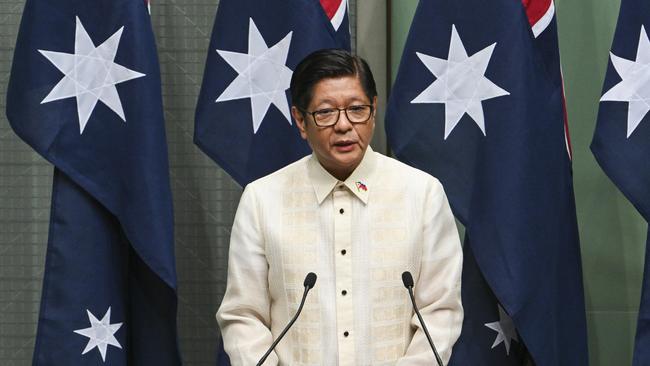
His speech to a joint sitting of parliament on Thursday morning was an unambiguous declaration of his country’s determination to hold the line against China’s territorial expansionism, and to do so hand-in-hand with its historical Pacific allies.
That it is Bongbong Marcos, the son of one of this region’s most notorious dictators, who has reversed the Philippines’ disastrous move away from the US and towards China under his predecessor Rodrigo Duterte may be the biggest political surprise of the past 18 months.
Whether or not it was last April’s Taiwan Strait crisis that prompted the Marcos administration’s to pivot back to its historical US ally when the Chinese simulated air and sea strikes and an encirclement of Taiwan – an island less than 150km at its closest point from the Philippines – it certainly gave Manila much to think about.
Mr Marcos on Thursday referred repeatedly to joint sacrifices made by Australian and Filipino personnel in the Pacific theatre of World War II to secure the peace and prosperity of our region in warning of the need to once again join forces to protect what previous generations fought to achieve.
“In Australia we see not only a strong democracy but an indispensable part of our Pacific community, a permanent stakeholder in the future of Asia. In Australia we see a natural partner in our efforts to defend, to preserve, to uphold our open, inclusive and rules-based international order,” he told parliament.
That should be music to the ears of the federal government, which treads the finest of lines with most of our ASEAN neighbours in reconciling our rightful place in the region.
For most ASEAN leaders, strategic ambiguity – and the right not to choose sides between two increasingly hostile superpowers – has become an article of faith.
The AUKUS pact only reinforced a view still popular in some quarters that we will never be more than a US deputy on the fringes of South-East Asia.
Mr Marcos has stood alone as the only ASEAN leader to unequivocally welcome AUKUS as a positive contributor to regional balance and security.
Equally, while his fellow ASEAN leaders have stayed silent in the face of regular intimidation by Chinese maritime forces of Philippines vessels within its own waters, Australia has regularly spoken out in support of Manila and its right to defend its territorial integrity.
It should therefore come as no surprise that it is to Australia and the US – the only two nations with which the Philippines has visiting status of forces defence agreements – that it should turn now for help to gird its defences against its far more powerful neighbour.
As Mr Marcos himself said on Thursday, the Philippines is “once again on the front lines against actions that erode regional peace, undermine regional stability and threaten regional success”.
It will need all the friends it can get.




Against all predictions, Philippines President Ferdinand “Bongbong” Marcos has become that rarest of political leaders in South-East Asia – one who is prepared to choose a side.